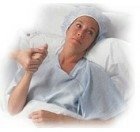 Well, again my mother is having surgery. And this time, she is again having hernia surgery. When she had surgery for a strangulated hernia in May, she discovered that she is even more sensitive to not only anesthesia but also to pain meds. She was given morphine and it totaly knocked her for a loop. I am seriously wondering if because she listened to music through headphones during the surgery, she needed much less morphine but they didn't think about this and just gave her what they would have given anyone else. She was seeing things that weren't there and talking non-stop about whatever popped into her head.
This time I am suggesting that she take the same music she listened to during surgery and listen to it in her room for at least 2 or 3 days. The body's memory of this music will help her to be calm and to relax. I'll let you know how it goes!
Happy Holidays!
Alice
Well, again my mother is having surgery. And this time, she is again having hernia surgery. When she had surgery for a strangulated hernia in May, she discovered that she is even more sensitive to not only anesthesia but also to pain meds. She was given morphine and it totaly knocked her for a loop. I am seriously wondering if because she listened to music through headphones during the surgery, she needed much less morphine but they didn't think about this and just gave her what they would have given anyone else. She was seeing things that weren't there and talking non-stop about whatever popped into her head.
This time I am suggesting that she take the same music she listened to during surgery and listen to it in her room for at least 2 or 3 days. The body's memory of this music will help her to be calm and to relax. I'll let you know how it goes!
Happy Holidays!
Alice
Monday, December 25, 2006
Music and Hernia Surgery
 Well, again my mother is having surgery. And this time, she is again having hernia surgery. When she had surgery for a strangulated hernia in May, she discovered that she is even more sensitive to not only anesthesia but also to pain meds. She was given morphine and it totaly knocked her for a loop. I am seriously wondering if because she listened to music through headphones during the surgery, she needed much less morphine but they didn't think about this and just gave her what they would have given anyone else. She was seeing things that weren't there and talking non-stop about whatever popped into her head.
This time I am suggesting that she take the same music she listened to during surgery and listen to it in her room for at least 2 or 3 days. The body's memory of this music will help her to be calm and to relax. I'll let you know how it goes!
Happy Holidays!
Alice
Well, again my mother is having surgery. And this time, she is again having hernia surgery. When she had surgery for a strangulated hernia in May, she discovered that she is even more sensitive to not only anesthesia but also to pain meds. She was given morphine and it totaly knocked her for a loop. I am seriously wondering if because she listened to music through headphones during the surgery, she needed much less morphine but they didn't think about this and just gave her what they would have given anyone else. She was seeing things that weren't there and talking non-stop about whatever popped into her head.
This time I am suggesting that she take the same music she listened to during surgery and listen to it in her room for at least 2 or 3 days. The body's memory of this music will help her to be calm and to relax. I'll let you know how it goes!
Happy Holidays!
Alice
Thursday, December 14, 2006
How about Ipods in Surgery?
 Should you take your iPod into surgery? About a year ago, the site www.livescience.com had this to say:
If you're headed for surgery, take your iPod.
A new study by the Yale School of Medicine confirms previous work showing that surgery patients listening to music require much less sedation.
Previous studies left open the question of whether it was music that did the trick, or just the act of blocking out the sound of dropped surgical instruments and other operating room noise.
In the new study, researchers tested 90 surgery patients at two facilities. Some wore headphones and listened to the music of their choice. Others heard white noise, that hiss and hum common to office buildings that's designed to drown out harsh noises. Others had no headphones.
Blocking sounds with white noise did not decrease sedative requirements, the study found, music did.
"Doctors and patients should both note that music can be used to supplement sedation in the operating room," said study team member Zeev Kain, a Yale professor in the Department of Anesthesiology.
This is significant folks. Listen up! And please let your doctor know as far in advance as possible that you want to use music through headphones or an iPod. You won't regret it!
Should you take your iPod into surgery? About a year ago, the site www.livescience.com had this to say:
If you're headed for surgery, take your iPod.
A new study by the Yale School of Medicine confirms previous work showing that surgery patients listening to music require much less sedation.
Previous studies left open the question of whether it was music that did the trick, or just the act of blocking out the sound of dropped surgical instruments and other operating room noise.
In the new study, researchers tested 90 surgery patients at two facilities. Some wore headphones and listened to the music of their choice. Others heard white noise, that hiss and hum common to office buildings that's designed to drown out harsh noises. Others had no headphones.
Blocking sounds with white noise did not decrease sedative requirements, the study found, music did.
"Doctors and patients should both note that music can be used to supplement sedation in the operating room," said study team member Zeev Kain, a Yale professor in the Department of Anesthesiology.
This is significant folks. Listen up! And please let your doctor know as far in advance as possible that you want to use music through headphones or an iPod. You won't regret it!
Thursday, November 30, 2006
Headphones for Surgery
 You probably remember that I am in the process of creating some special headphones for surgery. The patent is almost finalized but recently, I hit a little bump in the road. Seemingly out of the blue, it was brought to my attention that I would need FDA approval. At first I though "that can't be right" but the more I have investigated it, the more I have found that it does seem to be true! It seems that if you're making any sort of medical claim about a device, you must have FDA approval, whether it's an invasive device or not. Interesting, eh?
You probably remember that I am in the process of creating some special headphones for surgery. The patent is almost finalized but recently, I hit a little bump in the road. Seemingly out of the blue, it was brought to my attention that I would need FDA approval. At first I though "that can't be right" but the more I have investigated it, the more I have found that it does seem to be true! It seems that if you're making any sort of medical claim about a device, you must have FDA approval, whether it's an invasive device or not. Interesting, eh?
Tuesday, November 14, 2006
Why talk to the anesthesiologist?
 If you're thinking about using music with your surgery, you really do want to talk with the anesthesiologist first. Why? Because the anesthesiologist is the one whose job will be most affected by the patient's use of music. Why is that, you say? One of the main reasons to use music through headphones during surgery is because the patient is able to use up to 50% less anesthesia when they are hearing music through headphones during the procedure.
As I've said many times, even though there are many, many studies documenting this phenomenon,many physicians still are not aware of it and therefore will need to be educated about the benefits. If you're interested in trying it but don't know enough to talk with your doctor, use the link above to order my two-tape set which will give you the info you need as well as the music you need! You'll be so glad you did!
If you're thinking about using music with your surgery, you really do want to talk with the anesthesiologist first. Why? Because the anesthesiologist is the one whose job will be most affected by the patient's use of music. Why is that, you say? One of the main reasons to use music through headphones during surgery is because the patient is able to use up to 50% less anesthesia when they are hearing music through headphones during the procedure.
As I've said many times, even though there are many, many studies documenting this phenomenon,many physicians still are not aware of it and therefore will need to be educated about the benefits. If you're interested in trying it but don't know enough to talk with your doctor, use the link above to order my two-tape set which will give you the info you need as well as the music you need! You'll be so glad you did!
Saturday, October 21, 2006
It's in the news again!
 To my delight, there was an article in Wednesday's paper about a study in which patients having colonoscopies brought their iPods into surgery and the earbuds were taped in place. The results were that 44 men and 38 women used less anesthesia than patients not having the music. They did report the same amount of discomfort but if anesthesia was less and discomfort was the same, it's a plus! Talk to you doctor about it today! Or order my CD, tapes, or surgery download. Let's get the word out! Alice
To my delight, there was an article in Wednesday's paper about a study in which patients having colonoscopies brought their iPods into surgery and the earbuds were taped in place. The results were that 44 men and 38 women used less anesthesia than patients not having the music. They did report the same amount of discomfort but if anesthesia was less and discomfort was the same, it's a plus! Talk to you doctor about it today! Or order my CD, tapes, or surgery download. Let's get the word out! Alice
Wednesday, October 18, 2006
Grant proposal for surgery invention...now submitted
Sunday, October 08, 2006
An invention for music in surgery is being created
Thursday, September 14, 2006
Using Headphones for Surgery Music
 Surgeons and medical staff have been using music in the OR for sometime now, but few people really consider that the patient needs music too. Or that the music that the patient needs is very different from what the surgical staff needs.
While the medical staff performs surgery, they often listen to high energy upbeat music, especially for long surgeries. The patient, on the other hand, needs slow, steady, serene music that will keep their bodies relaxed and bio-rhythms stabilized. This is why headphones for the patient should really be standard procedure. I have had back surgery with a Walkman and tapes I put together and I have helped dozens of other people choose music for their surgery.
If you're going to have surgery in the near future, please contact me and let me help you choose the perfect music for YOU!
Surgeons and medical staff have been using music in the OR for sometime now, but few people really consider that the patient needs music too. Or that the music that the patient needs is very different from what the surgical staff needs.
While the medical staff performs surgery, they often listen to high energy upbeat music, especially for long surgeries. The patient, on the other hand, needs slow, steady, serene music that will keep their bodies relaxed and bio-rhythms stabilized. This is why headphones for the patient should really be standard procedure. I have had back surgery with a Walkman and tapes I put together and I have helped dozens of other people choose music for their surgery.
If you're going to have surgery in the near future, please contact me and let me help you choose the perfect music for YOU!
Friday, September 08, 2006
Benefits of Music During Surgery
Tuesday, July 11, 2006
Music and Surgery, Pt. 3
Are you dissatisfied with your medical and hospital experiences? If you are, join the community of thousands who feel that going to a hospital just might make them worse!! With each passing day there are frightening stories or patients contracting staph infections, getting the procedure intended for someone else, having equipment left inside of them after surgeon has sewn them up and on and on. It's enough to make you want to get lots more involved with your own health and learn more about how to stay healthy and create new eating and exercising habits! Recently I've written quite a bit about the importance of you, the patient, having your own music during surgery. I continue to get questions, thanks and requests for personal consultations before surgery. It really doesn't matter if you're having out-patient surgery for something like a colonoscopy, a laser treatment or even chemotherapy, or if you're having inpatient major surgery for heart bypass, ruptured disk or hysterectomy.
The facts are clear: patients who are listening to their own favorite, self-selected, slow and steady instrumental music, need less anxiety medication before the procedure, less anesthesia during the procedure, and less pain medication after the procedure. There are hundreds of studies from hospitals and clinics around the world documenting this fact but surprisingly, most hospital operating rooms do not provide music for patient. Many surgeons are now bringing their own favorite music into the OR, but the patient is thought to be "asleep" and unaffected. Not true! Many patients have reported to me that they heard conversations between various staff members, comments from the surgeon and even frightening words such as "doesn't look good," "worse than I thought" or even "oops!" What can you do? If you have some advance notice that you need surgery, get a good Walkman or Discman, choose your favorite music that has a slow, steady tempo and no words or lyrics (a favorite is always the Pachelbel Canon in D) and let your surgeon know that you want to use music during your surgery. Remember, it's not about entertainment, it's about stabilizing body rhythms, keeping the muscles relaxed, and blocking out OR conversations and bleeping machines. The surgeon and anesthesiologist needs to hear these things, but the patient definitely does not! If you want a consultation with me before your procedure, contact me through my website at http://www.healingmusicenterprises.com/ or call me at 502-419-1698. Hope to hear from you soon! Your partner in good health, Dr. Alice Cash Clinical Musicologist Licensed Clinical Social Worker
Thursday, July 06, 2006
Surgery with Music, Pt. 2
Friday, June 30, 2006
Music for Surgery: Profile of Hysterectomy Patient
Music with Surgery: Why?
Alice H. Cash, Ph.D., LCSW www.HealingMusicEnterprises.com www.DrCashPrefers.com






